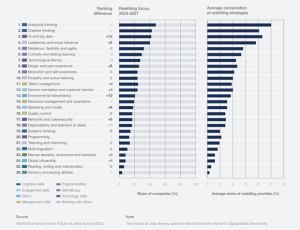The most relevant skills for the next 5 years
According to the Future of Jobs Report of the World Economic Forum, released in May 2023, over the next five years companies will increasingly invest in training workers to develop cognitive skills-analytical thinking and creative thinking-useful in solving complex problems in the workplace. Then there are other skills that companies will value as increasingly relevant in training their workers or finding new talent: expertise in artificial intelligence and big data first and foremost, followed by leadership and social influence skills.
The ranking of skills
Analysis of the report’s data shows that professional training in the period 2023-2027 will focus on analytical thinking, which is expected to account for an average of 10 percent of training initiatives. Second, creative thinking will be the subject of 8 percent of workforce skill improvement initiatives. Training workers in the use of artificial intelligence and big data ranks third among corporate priorities in terms of skill development over the next five years and will be a priority for 42 percent of companies surveyed. Employers also intend to focus on developing workers’ skills in leadership skills and social influence (40 percent of companies); resilience, flexibility and agility (32 percent); and curiosity and lifelong learning (30 percent). While respondents believe that no skills are in sharp decline, according to substantial minorities of companies reading, writing, math, global citizenship, sensory processing skills, manual dexterity, endurance and accuracy will become of decreasing importance to their workers in the future.

Rapidly growing
The report specifies that some skills will grow in importance faster than others. For example, companies are placing artificial intelligence and big data 12 places higher in their skill development strategies for the next five years than they do now, and report that they will invest about 9 percent of their workforce retraining efforts in these areas-a higher percentage than their planned investment in creative thinking, which nevertheless moves them ahead in their ranking of corporate skill development priorities. Leadership and social influence rank five positions higher than their current importance and represent the behavioral competencies in which companies want to invest most. Other capabilities strategically emphasized by business are those in design and user experience, environmental management, marketing and media, and networks and information security.
More can be done
Forty-four percent of employers believe that the current skills of their workforce will need to be revolutionized in the next five years, and two-thirds of companies expect to reap the benefits of their investment in vocational training within a year, in the form of increased cross-role mobility, increases in worker satisfaction or productivity. In fact, companies believe that skill gaps in the labor market are the main obstacle toward realizing the transformation of their industry and are convinced that investing in workplace learning and training is the most promising strategy for the workforce to achieve their business goals. Despite this awareness, companies still need to do a lot to develop pathways for professional skills development: six out of ten workers will need training before 2027, but today only half of them have access to adequate training opportunities.










0 Comments